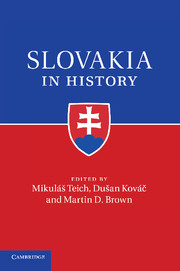Book contents
- Frontmatter
- Contents
- List of figures
- List of maps
- Notes on contributors
- Acknowledgements
- Map 1 Slovak Republic
- 1 Slovakia, the Slovaks and their history
- 2 The Duchy of Nitra
- 3 The beginnings of the nobility in Slovakia
- 4 Medieval towns
- 5 Renaissance and humanist tendencies in Slovakia
- 6 The period of religious disturbances in Slovakia
- 7 The Enlightenment and the beginnings of the modern Slovak nation
- 8 Slovak Slavism and Panslavism
- 9 The Slovak political programme: from Hungarian patriotism to the Czecho-Slovak state
- 10 Slovakia in Czechoslovakia, 1918–1938
- 11 Slovakia from the Munich Conference to the declaration of independence
- 12 The Slovak state, 1939–1945
- 13 The Slovak question and the resistance movement during the Second World War
- 14 The Slovak National Uprising: the most dramatic moment in the nation's history
- 15 The Slovak question, 1945–1948
- 16 Czechoslovakism in Slovak history
- 17 The Magyar minority in Slovakia before and after the Second World War
- 18 The establishment of totalitarianism in Slovakia after the February coup of 1948 and the culmination of mass persecution, 1948–1953
- 19 Slovakia and the attempt to reform socialism in Czechoslovakia, 1963–1969
- 20 Slovakia's position within the Czecho-Slovak federation, 1968–1970
- 21 Slovakia under communism, 1948–1989: controversial developments in the economy, society and culture
- 22 The fall of communism and the establishment of an independent Slovakia
- 23 Afterword: Slovakia in history
- Index
9 - The Slovak political programme: from Hungarian patriotism to the Czecho-Slovak state
Published online by Cambridge University Press: 07 October 2011
- Frontmatter
- Contents
- List of figures
- List of maps
- Notes on contributors
- Acknowledgements
- Map 1 Slovak Republic
- 1 Slovakia, the Slovaks and their history
- 2 The Duchy of Nitra
- 3 The beginnings of the nobility in Slovakia
- 4 Medieval towns
- 5 Renaissance and humanist tendencies in Slovakia
- 6 The period of religious disturbances in Slovakia
- 7 The Enlightenment and the beginnings of the modern Slovak nation
- 8 Slovak Slavism and Panslavism
- 9 The Slovak political programme: from Hungarian patriotism to the Czecho-Slovak state
- 10 Slovakia in Czechoslovakia, 1918–1938
- 11 Slovakia from the Munich Conference to the declaration of independence
- 12 The Slovak state, 1939–1945
- 13 The Slovak question and the resistance movement during the Second World War
- 14 The Slovak National Uprising: the most dramatic moment in the nation's history
- 15 The Slovak question, 1945–1948
- 16 Czechoslovakism in Slovak history
- 17 The Magyar minority in Slovakia before and after the Second World War
- 18 The establishment of totalitarianism in Slovakia after the February coup of 1948 and the culmination of mass persecution, 1948–1953
- 19 Slovakia and the attempt to reform socialism in Czechoslovakia, 1963–1969
- 20 Slovakia's position within the Czecho-Slovak federation, 1968–1970
- 21 Slovakia under communism, 1948–1989: controversial developments in the economy, society and culture
- 22 The fall of communism and the establishment of an independent Slovakia
- 23 Afterword: Slovakia in history
- Index
Summary
The ideology of nationalism exerted a powerful influence on the social thought, politics, culture and economics of Europe from the end of the eighteenth century through the nineteenth century; these factors also affected the Slovaks.
European nationalism rooted itself in the fertile soil produced by the rapid social changes that were occurring all over Europe during this period, but always in specific historic forms. Industrialisation, urbanisation and the modernisation that was associated with them combined with the rapid expansion of the socio-economic influence of the industrial and financial bourgeoisie, weakened the old social relationships that had been based on feudal principles and on the ancient privileges of the nobility. The advocates of the Enlightenment and incipient liberalism were soon engaged in a struggle against the old monarchic, dynastic and feudal principles that continued to dominate the continent, and they directed their attention not to traditional groups, but rather to what they defined as natural human communities.
Across a large swathe of Europe, the new cultural phenomenon of Romanticism became obsessed with ethnic manifestations – folk languages, folk literature and folklore. The comparative studies of Miroslav Hroch have shown that many ethnic groups, even those without their own ethnic or national states, all followed much the same line of development. The typical national movement began with a scholarly phase, in which an intellectual elite took an intense interest in the language, literature and history of its nation. Eventually, this scholarly interest led to a phase of political agitation.
- Type
- Chapter
- Information
- Slovakia in History , pp. 120 - 136Publisher: Cambridge University PressPrint publication year: 2011



